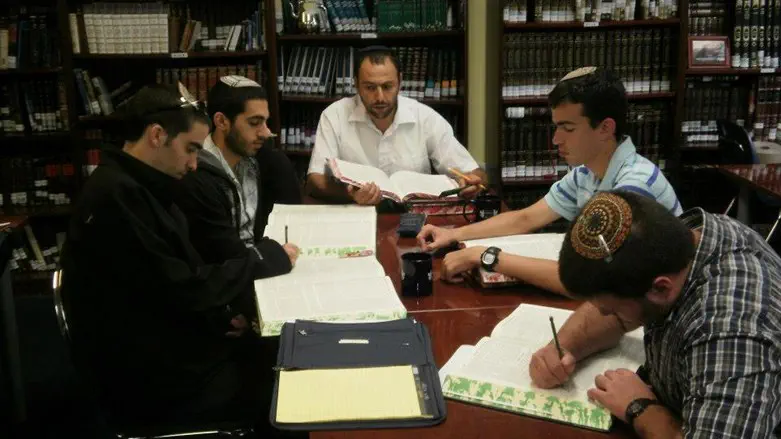
ל וַיֹּאמֶר יַעֲקֹב אֶל-שִׁמְעוֹן וְאֶל-לֵוִי, עֲכַרְתֶּם אֹתִי, לְהַבְאִישֵׁנִי בְּיֹשֵׁב הָאָרֶץ, בַּכְּנַעֲנִי וּבַפְּרִזִּי; וַאֲנִי, מְתֵי מִסְפָּר, וְנֶאֶסְפוּ עָלַי וְהִכּוּנִי, וְנִשְׁמַדְתִּי אֲנִי וּבֵיתִי.
And Jacob said to Simeon and Levi: 'Ye have troubled me, to make me odious unto the inhabitants of the land, even unto the Canaanites and the Perizzites; and, I being few in number, they will gather themselves together against me and smite me; and I shall be destroyed, I and my house.'
לא וַיֹּאמְרוּ: הַכְזוֹנָה, יַעֲשֶׂה אֶת-אֲחוֹתֵנוּ. {פ}
And they said: 'Should one deal with our sister as with a harlot?'
The debate between Yaakov and Shimon and Levi is presented as a classic confrontation of pragmatism versus idealism. Yaakov raises no moral arguments against their actions; only the realpolitik concern that in their rampage, they had endangered the family’s safety. For their part, Shimon and Levi see the world in the black and whites of the idealist. Right is right, wrong is wrong. Supported by his town folk, Shchem had raped and kidnapped Dina, held her hostage and negotiated a forced wedding. Four words: “הכזונה יעשה את אחותינו “say it all. End of discussion.
וַיִּסָּעוּ; וַיְהִי חִתַּת אֱלֹהִים, עַל-הֶעָרִים אֲשֶׁר סְבִיבוֹתֵיהֶם, וְלֹא רָדְפוּ, אַחֲרֵי בְּנֵי יַעֲקֹב.
And they journeyed; and a terror of God was upon the cities that were round about them, and they did not pursue after the sons of Jacob
At first glance, the Torah seems to agree. Yaakov has no retort. His fears for the family’s safety turn out to be unfounded. G-d protects Yaakov and his children - no calamity befalls the nascent Jewish people. Reading the story, one can argue (as Shimon and Levi probably did) that “the terror of G-d” protecting them was in reward for their bold and direct action in the service of justice. Not only had they not endangered the family, they had actually saved it.
Some fifty years later, Yaakov finally responds:
שִׁמְעוֹן וְלֵוִי, אַחִים--כְּלֵי חָמָס, מְכֵרֹתֵיהֶם.
Simeon and Levi are brethren; weapons of violence their kinship.
ו בְּסֹדָם אַל-תָּבֹא נַפְשִׁי, בִּקְהָלָם אַל-תֵּחַד כְּבֹדִי: כִּי בְאַפָּם הָרְגוּ אִישׁ…
Let my soul not come into their council; unto their assembly let my glory not be united; for in their anger they slew men…
Pragmatism plays no part in Yaakov’s deathbed reprimand. Violence was wrong, innocent people were killed. End of discussion.
Had Yaakov thought this all along? If so, why did he not repudiate Shimon and Levi immediately? Why did he wait fifty years to speak his mind? The Midrash Raba finds the answer to these questions in one word of Yaakov’s rebuke. Commenting on the word “אחים”, “brethren” The midrash comments:
שמעון ולוי אחים, אחים לדינה ולא ליוסף...Shimon and Levi are brethren – to Dina, not to Yosef…
In that four word commentary, the Midrash asks that we examine who Shimon and Levi really were and what laid behind their actions. Were they really outraged idealists willing to risk their lives in order to see justice served? Or were they just hotheaded vigilantes for whom blood was cheap. Are their actions to be viewed as justified killing or as inexcusable violence?
Yaakov was initially silent in the face of their response because he did not know the answer.
“Brethren - to Dina, not to Yosef…”
However, with the passing of 50 years with everything that had occurred in the interim, Yaakov knew all too well. Having discovered the violence that they had planned for Yosef (who, if not Shimon and Levi, had called for his death at the pit?), Yaakov understood what their true motivations must have been when they had killed the inhabitants of Shechem “in their anger”. By plotting to kill Yosef, they showed that the moral stance they had taken in their defense had been a sham. Violence, not justice, was their ideal.
Rationalization, in a quip attributed to Freud, is the substitution of a “good” reason for the real reason that lies behind our actions. Yaakov, Shimon and Levi – all of us – live in a world of gray, of morals at conflict, with choices and decisions to make. We, like Shimon and Levi, can find the appropriate good reason to explain away even an inexcusable act. “Brethren - to Dina, not to Yosef…” calls on us to uncover the real reasons that fuel our decisions and, in the process, to discover who we really are.
Rabbi Yehuda Susman is former Rosh Kollel in Chicago (1999-2002) and currently Rosh Yeshiva at Eretz Ha'Tzvi
Torah MiTzion stands in the forefront of the battle for the future of the Jewish people in the Diaspora, offering religious-Zionist Torah scholarship to Jewish communities throughout the world and strengthening the bond between the Jewish people in the Diaspora and in Israel via the study of Torah.